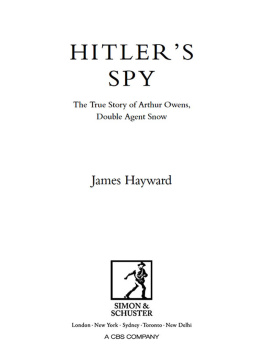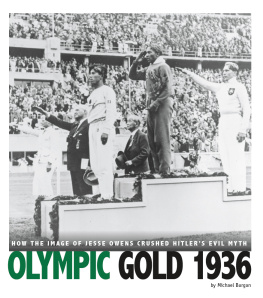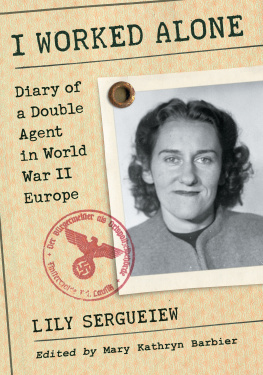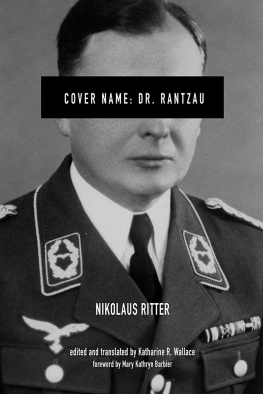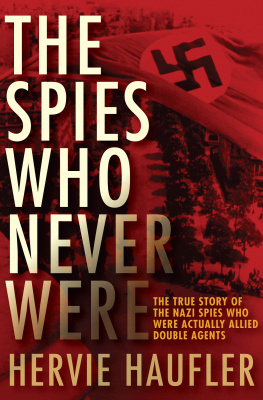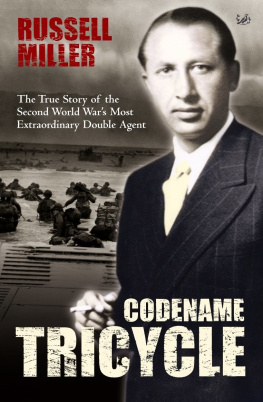HITLERS SPY
ALSO BY JAMES HAYWARD
Shingle Street
The Bodies on the Beach
Myths and Legends of the First World War
Myths and Legends of the Second World War
Never Such Innocence Again

First published as Double Agent Snow in Great Britain
by Simon & Schuster UK Ltd, 2012
This paperback edition published by Simon & Schuster UK Ltd, 2014
A CBS COMPANY
Copyright 2012 by James Hayward
This book is copyright under the Berne Convention.
No reproduction without permission.
All rights reserved.
The right of James Hayward to be identified as the author of this work has been asserted by him accordance with sections 77 and 78 of the Copyright, Designs and Patents Act, 1988.
Simon & Schuster UK Ltd
1st Floor
222 Grays Inn Road
London WC1X 8HB
www.simonandschuster.co.uk
Simon & Schuster Australia, Sydney
Simon & Schuster India, New Delhi
The author and publishers have made all reasonable efforts to contact copyright-holders for permission, and apologise for any omissions or errors in the form of credits given. Corrections may be made to future printings.
A CIP catalogue record for this book
is available from the British Library
ISBN: 978-0-85720-856-9
ISBN: 978-1-47113-263-6 (ebook)
Typeset in the UK by M Rules
Printed and bound by CPI Group (UK) Ltd, Croydon, CR0 4YY
History with its flickering lamp stumbles along the trail of the past, trying to reconstruct its scenes, to revive its echoes...
WINSTON CHURCHILL (November 1940)
DRAMATIS PERSONAE
Arthur Owens the troublesome British double agent codenamed SNOW by MI5, and JOHNNY by the German Abwehr. Hitlers chief spy in England between 1937 and 1941.
Captain Thomas Robertson Snows long-suffering case officer at MI5, informally known as Tommy or Tar.
Guy Liddell Robertsons immediate superior at MI5, where he is head of B Division (counter-espionage).
Major Nikolaus Ritter Snows flamboyant German handler, based at Stelle X in Hamburg, aka Doctor Rantzau.
Lily Bade Snows beguiling mistress, of German descent and thirteen years his junior.
Bob Owens Snows eldest son, referred to as Snow Junior by MI5.
William Rolph a former MI5 officer employed to supervise Snow between February and May of 1940.
Gwilym Williams a former policeman from Swansea, hired by MI5 to help Snow run his imaginary Welsh ring in 1939 (aka Agent G.W.).
Sam McCarthy a dope smuggler of Canadian origin, and Snows second MI5 sidekick in 1940 (aka Agent Biscuit).
Walter Dicketts the veteran confidence trickster employed as sidekick #3 from late 1940 onwards (aka Agent Celery).
Wulf Schmidt a German parachute agent and close personal friend of Ritter, turned by MI5 as Agent Tate.
Gsta Caroli another German parachute agent, dropped into England in 1940 and turned as Agent Summer.
John Masterman a colleague of Robertson and Liddell at MI5, later chairman of the so-called Twenty Committee charged with running Allied double agents.
PROLOGUE
On the night of Saturday, 19 April 1941, in lethal celebration of Adolf Hitlers fifty-second birthday, corpulent German air force chief Hermann Gring dispatched 700 bombers to London, intent on delivering his Fhrer a gift to remember. Flying in relays for seven hours, many crews managed to squeeze in two missions, with the keenest of the Luftwaffe bombardiers even notching up three. For the first time during the Blitz and the last the long tail of Heinkels, Junkers and Dorniers were able to drop 1,000 tonnes of high explosive on the beleaguered capital. Thanks to cloud overcast most of the raiders bombed blind, scattering their payloads wildly, killing 1,200 people and triggering more than a thousand major fires. The small price paid only added to mordant Nazi delight, das Tausendtonnengeschenk costing the Luftwaffe just four aircraft lost.
Major Thomas Tar Robertson of B Division, MI5, drew back a corner of the heavy blackout curtain covering the office window at 54 Broadway. Beyond Green Park parachute mines and incendiaries rained down on Mayfair, demolishing banks, tailors and gentlemens clubs. Searchlights, tracer and phosphorus dazzled; fire consumed. The war news from overseas was no more encouraging. Having routed the Yugoslavian army, victorious German troops had pushed back Allied forces in Greece and southern Albania, raising the possibility of yet another chaotic British evacuation by sea. On the other side of the Mediterranean the port of Tobruk was under determined siege by Rommels Afrika Korps, while the recent destruction of several U-boats failed to disguise the fact that the tide of the Battle of the Atlantic was still running in Germanys favour.
That a mysterious female agent with good legs had been observed stepping off the Lisbon plane at Whitchurch held a measure of promise for Robertson and Section B1A. All things considered, however, this trifling development was unlikely to bring about a swift Allied victory.
Besides, everything paled into insignificance beside the crisis of confidence which had lately enveloped Tars star double agent. Codenamed SNOW by MI5, and JOHNNY by their opposite numbers in Germany, for the last five years the diminutive Welshman born Arthur Graham Owens had operated as Hitlers chief spy in England, masquerading as a nationalist traitor in return for an astronomic salary and a vanity rank. In truth Agent Snow was planting disinformation on the bungling German Abwehr, a bodyguard of lies by which Robertsons department hoped to reverse the disastrous flow of events since Dunkirk, making the so-called double-cross system one of the few effective weapons in a British armoury still desperately short of tangible hardware.
The flaw in this ingenious deception scheme was Snow himself. Even by the standards of the rogues gallery of hustlers and shadowplayers run by B1A, Arthur Owens was more trouble than a barrel of Barbary apes. The little man had endeared himself to no one in the Service, a string of sceptical handlers noting a penchant for expensive motors, cheap women and flights of wild egotistical fancy that would shame Walter Mitty. In drink he is probably not completely aware on these occasions that what he is saying is a lie, rued the latest glum case summary. Similar doubts have pervaded his motives in acting as an agent. At times in his complicated career Agent Snow has seen himself as a patriot doing dangerous and valuable work for his country; at other times, no less genuinely, as a daring spy, clever enough to outwit British Intelligence.
Lisbon had been his nadir. Two months earlier, in February 1941, Owens had flown to Portugal to treff with his German handler, Herr Doktor Rantzau, only to return to London bearing a bullish peace proposal drafted by high-ranking Nazis. Worse still, Owens now insisted that he had been unmasked as a British double agent by the other side.
Fox shot, flush busted.
Instinct told Robertson that the vital double-cross secret was probably safe. After all, Snow had returned from Lisbon very much alive, his pockets bulging with sterling and dollars, and a veritable Woolwich arsenal of exploding pens. However, Owens appeared now to be a burnt-out case, pleading duodenal ulcers while at the same time sinking a bottle of brandy a day, and increasingly desperate to please Lily Bade, the high-maintenance floozy who had lately given birth to their child. Had the schizophrenic complexities of the disorientating double-cross realm become too much to bear? Or had Snow simply fabricated his tale of illness and exposure in Iberia in order to engineer a comfortable retirement with a foot in both camps?

